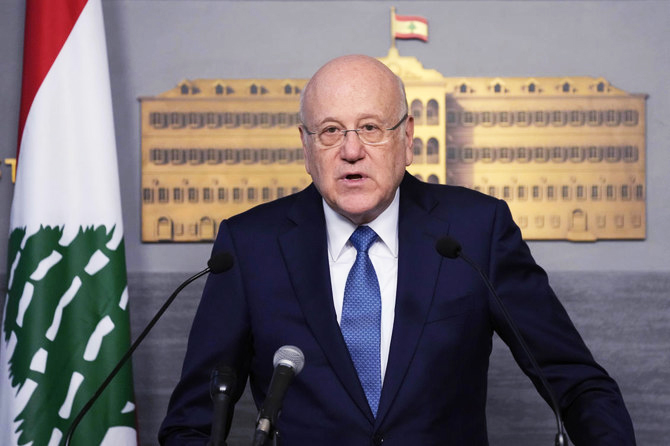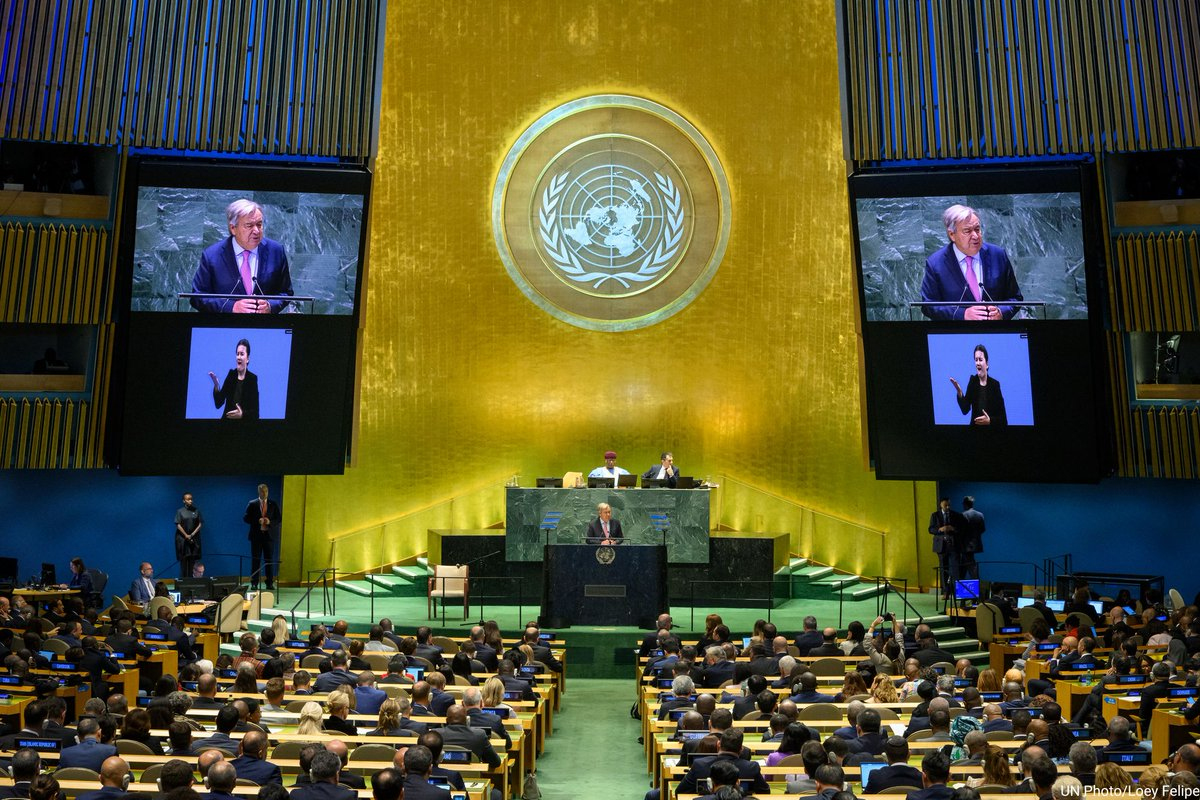Share
UN Security Council holds emergency meeting on Lebanon amid Israel-Hezbollah conflict
Israel denies agreeing to Lebanon ceasefire

Beirut (Xinhua) — Lebanese Prime Minister Najib Mikati has welcomed a temporary ceasefire proposal in Lebanon unveiled during a United Nations Security Council (UNSC) emergency meeting, and has urged compelling Israel to restore regional security, said a statement released Thursday by the Lebanese Council of Ministers.
"The key to its (the proposal's) implementation is through Israel's commitment to enforcing international resolutions," Mikati said at the UNSC emergency meeting on Lebanon Wednesday, the second UNSC meeting on the country's deteriorating situation in less than a week.
"My presence here aims to come out of this session with a serious solution based on the combined efforts of all members of the Security Council to pressure Israel to immediately cease fire on all fronts and restore security and stability to our region," Mikati said.
Also read: US, allies call for immediate 21-day cease-fire between Israel, Hezbollah
Mikati reaffirmed Lebanon's commitment to UN Resolution 1701 issued in 2006, calling on the UNSC to work seriously and immediately to ensure Israel's withdrawal from all occupied Lebanese territories and to stop its daily violations.
He also called for an immediate halt to "Israeli aggression on Gaza," stating that its repercussions directly affect Lebanon and the region, warning that the situation could escalate throughout the Middle East if not addressed quickly.
"Lebanon is witnessing today an unprecedented escalation, with the enemy resorting to new means, especially electronic ones, to harm people," he said, refuting Israel's claim that its attacks targeted only Hezbollah members and militants, Xinhua news agency reported.
During the UNSC emergency meeting on Wednesday, France proposed a 21-day ceasefire in Lebanon in UN diplomacy with the United States "to allow for negotiations."
On Thursday, Israeli Prime Minister Benjamin Netanyahu's office denied in a statement that the country has agreed to a ceasefire with Lebanese armed group Hezbollah and Lebanese political parties.
Meanwhile, Israeli Foreign Minister Israel Katz said on social media platform X that Israel would not consider a truce.
לא תהיה הפסקת אש בצפון. נמשיך להילחם נגד ארגון הטרור חיזבאללה בכל העוצמה עד לניצחון והשבת תושבי הצפון בביטחון לבתיהם.
— ישראל כ”ץ Israel Katz (@Israel_katz) September 26, 2024
On Monday and Tuesday, Israel conducted its most extensive attacks on Lebanon since 2006, resulting in more than 550 deaths and over 1,800 injuries across the country. It resumed intensive airstrikes on eastern and southern Lebanon on Wednesday evening, carrying out about 70 raids on the areas of Baalbek, Hermel, and Western Bekaa in eastern Lebanon.
Lebanese Environment Minister Nasser Yassin said Wednesday that Israel's bombardment had displaced over 150,000 residents over the past 72 hours.
The sharp escalation has raised concerns about a potential full-scale conflict between Israel and Lebanon, with fears that other regional powers could also be sucked in.

United Nations — Requested by France, the UN Security Council on Wednesday convened an emergency meeting on Lebanon, the second meeting on the country's deteriorating situation in less than a week, with UN Secretary-General Antonio Guterres saying that "hell is breaking loose in Lebanon."
In his remarks, Guterres urged the Security Council "to work in lock-step" to end the escalating violence between Israeli forces and Hezbollah militants across the Blue Line, a buffer zone in southern Lebanon.
Hezbollah and Israel must pull back from the brink of a potentially catastrophic regional war, he insisted, adding that there was now massive civilian displacement from southern and eastern Lebanon towards the Lebanese capital of Beirut, while the Israelis have endured repeated attacks from Hezbollah with more than 8,300 rockets, drones and increasingly high caliber missile attacks on military targets and residential areas.
With an appeal for both sides to respect Lebanese sovereignty, Guterres said that Lebanon "must have full control of its weapons" throughout the country. "We support all efforts to strengthen the Lebanese Armed Forces," he added.
"We say it very clearly and honestly: what we have been witnessing over the past year in Gaza and what we are witnessing now in Lebanon is likely to expand to other areas in the region if the international community does not shoulder its responsibility to put an end to the machine of death and destruction," Badr Ahmed Mohamed Abdelatty, Minister for Foreign Affairs, Emigration and Egyptian Expatriates of Egypt, told the meeting.
"They are spreading terror and fear among Lebanese citizens ... We cannot bear to lose another generation because of the war," said Lebanese Prime Minister Najib Mikati.
"The ongoing aggression against Lebanon is fueled by the failure of the international community, and in particular by the UN Security Council, to hold Israel accountable for war crimes and genocide in Gaza," said Seyyed Abbas Araghchi, Iranian foreign minister, Xinhua news agency reported.
France on Wednesday unveiled a proposal for a 21-day ceasefire in Lebanon in UN diplomacy with the United States as the death toll mounted in deadly strikes by Israel. French Foreign Minister Jean-Noel Barrot said that the two Western powers were proposing a "temporary ceasefire" of 21 days "to allow for negotiations."
The Arab League Council has at the level of foreign ministers warned of the repercussions of escalating "the Israeli aggression" against Lebanon in light of recent developments, which could lead to the outbreak of a large-scale regional war and threaten the security and stability of the entire region.
Israel said on Wednesday it was readying troops for a potential ground incursion into Lebanon, telling soldiers to prepare to "enter enemy territory" as it called up more reservists and sent world leaders scrambling to prevent a full-scale war with Hezbollah militants. "We are preparing the process of a maneuver," Israeli Military Chief Herzi Halevi told troops at an exercise along the northern border.
Israeli warplanes resumed intensive airstrikes on eastern and southern Lebanon on Wednesday evening, carrying out about 70 raids on the areas of Baalbek, Hermel, and Western Bekaa in eastern Lebanon.
On Monday and Tuesday, Israel conducted its most extensive attacks on Lebanon since 2006, resulting in more than 550 deaths and over 1,800 injuries across the country. Lebanese Environment Minister Nasser Yassin said Israel's bombardment has displaced over 150,000 residents over the past 72 hours.
The sharp escalation has raised concerns about a potential full-scale conflict between Israel and Lebanon, with fears that other regional powers could also be sucked in.
Jerusalem — Israel denied on Thursday that it has agreed to a ceasefire with the Lebanese armed group Hezbollah and Lebanese political parties.
In a statement, Israeli Prime Minister Benjamin Netanyahu's office said that "the report on a ceasefire is untrue."
The office said that Netanyahu "didn't even respond to" the ceasefire proposal, which was brokered by the United States and France.
Also on Thursday, Israeli Foreign Minister Israel Katz said Israel would not consider a truce, Xinhua news agency reported.
"There won't be a ceasefire," he wrote on social media platform X. He said the country would continue its fight against Hezbollah "until victory and until residents could return to their homes in the north."